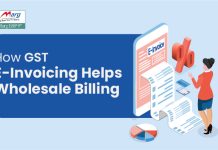Recent Updates on e-Invoicing:
10th May 2023
The implementation of the 6th phase of e-invoicing has been recently announced by the Central Board of Indirect Taxes and Customs (CBIC). Starting from 1st August 2023, businesses with an annual turnover of ?5 crore or more in any financial year since 2017-18 will be mandated to issue e-invoices. This initiative is a significant move by the government to encourage the use of digital transactions and facilitate the shift towards a digital economy.
Unraveling the Efficiency of E-Invoicing: Streamlining Financial Transactions for Businesses
Introduction
In today’s fast-paced digital era, businesses are continually seeking ways to streamline their operations and enhance efficiency. One such groundbreaking innovation that has revolutionized financial transactions is E-Invoicing. Gone are the days of paper-based invoicing, as electronic invoicing has emerged as a seamless, secure, and eco-friendly alternative. In this blog, we’ll delve into the world of E-Invoicing, exploring what it is, how it works, and the numerous benefits it offers to businesses of all sizes.
Understanding E-Invoicing
E-Invoicing, short for Electronic Invoicing, is the process of electronically generating, transmitting, and receiving invoices between suppliers and buyers. Unlike traditional paper-based invoices, E-Invoices are entirely digital, eliminating the need for physical paperwork, postal services, and manual data entry. These invoices are typically exchanged through secure electronic networks, ensuring swift and reliable communication between parties.
The Mechanics of E-Invoicing
The process of E-Invoicing is straightforward and highly efficient. It involves the following key steps:
a) Invoice Generation: Suppliers create digital invoices using accounting software or specialized E-Invoicing platforms. The invoices contain all the necessary transaction details, including product descriptions, quantities, prices, and applicable taxes.
b) Invoice Transmission: Once the E-Invoice is generated, it is securely transmitted to the buyer’s system. This transmission can occur through various channels, such as Electronic Data Interchange (EDI), email, or dedicated E-Invoicing portals.
c) Invoice Reception: Upon receiving the E-Invoice, the buyer’s system processes the information automatically, validating the invoice against pre-defined parameters and matching it with relevant purchase orders or contracts.
d) Payment Processing: After verification, the buyer proceeds with payment, and the system updates the invoice status accordingly. Payments can be facilitated through various electronic payment methods, further streamlining the financial transaction.
The Advantages of E-Invoicing
The adoption of E-Invoicing brings numerous benefits to businesses, positively impacting their financial processes and overall efficiency.
a) Enhanced Accuracy and Reduced Errors: Manual data entry is prone to errors, leading to payment delays and reconciliation issues. E-Invoicing minimizes such errors by automating the data exchange process, ensuring accuracy in billing and reducing the risk of disputes.
b) Faster Payment Cycles: Traditional paper-based invoicing involves delays in mailing and processing. With E-Invoicing, invoices are transmitted instantly, accelerating the payment cycle and improving cash flow for both suppliers and buyers.
c) Cost Savings: E-Invoicing significantly reduces paper consumption, printing costs, and postage expenses. Additionally, the automated processing lowers administrative overheads and frees up resources for more strategic tasks.
d) Improved Transparency: E-Invoicing provides real-time tracking and monitoring of invoices, offering insights into payment status, outstanding balances, and transaction history. This transparency fosters better supplier-buyer relationships.
e) Eco-Friendly Solution: By eliminating paper usage, E-Invoicing contributes to environmental sustainability and aligns with corporate social responsibility goals.
Global Adoption and Legal Compliance
E-Invoicing has gained widespread acceptance globally due to its tangible benefits. Governments in various countries have also recognized its potential and implemented legal frameworks to regulate E-Invoicing practices. Businesses must ensure compliance with these regulations to avoid penalties and maintain smooth operations.
Security and Data Protection
Additionally, digital invoicing reduces the reliance on physical documents that could be misplaced, lost, or fall into the wrong hands. This further enhances the overall security of financial transactions and protects businesses and their clients from potential fraud.
Seamless Integration with Accounting Systems
E-Invoicing solutions are designed to seamlessly integrate with existing accounting and enterprise resource planning (ERP) systems. This integration enables smooth data flow between different business processes, eliminating the need for manual data entry and reducing the chances of human errors. By automating invoice processing, E-Invoicing fosters better accuracy and efficiency in financial record-keeping, making audits and financial reporting much simpler and faster.
Increased Productivity and Time Savings
Time is a valuable resource for any business, and E-Invoicing optimizes the time spent on manual administrative tasks. By automating invoice generation, transmission, and processing, employees can focus on more strategic and value-added activities. This boost in productivity not only enhances operational efficiency but also improves employee satisfaction and reduces burnout.
Scalability and Flexibility
E-Invoicing solutions cater to businesses of all sizes, from small startups to multinational corporations. As businesses grow and expand, the digital invoicing system can easily scale to accommodate the increased volume of transactions. Moreover, E-Invoicing platforms often offer customizable features to meet specific business needs, making them adaptable to different industries and unique business processes.
Global Connectivity and Standardization
With the advent of globalized markets, businesses often engage in transactions with international partners. E-Invoicing streamlines cross-border transactions by providing a standardized invoicing format that is recognized and accepted worldwide. This standardization improves communication between businesses from different countries, reduces language barriers, and ensures compliance with various international regulations.
Government Incentives and Green Initiatives
In many regions, governments incentivize businesses to adopt E-Invoicing as part of their efforts to promote digitalization and environmental sustainability. Governments recognize the benefits of reduced paper usage and administrative burden, and as a result, they offer tax incentives, grants, or other rewards for businesses that transition to E-Invoicing.
Conclusion
E-Invoicing is more than just a digital alternative to paper-based invoices. It represents a pivotal shift in how businesses conduct financial transactions, offering a plethora of advantages that go beyond efficiency and cost savings. From promoting environmental sustainability to fostering seamless collaboration in global markets, E-Invoicing stands at the forefront of digital innovation.
As businesses continue to adapt to the dynamic landscape of the digital age, embracing E-Invoicing is no longer a choice but a strategic imperative. Its transformative impact on financial processes, enhanced security, and contributions to sustainable practices position E-Invoicing as a catalyst for business growth, resilience, and competitiveness in the modern world. Embrace E-Invoicing today, and unlock the potential to lead your business into a brighter and more prosperous future.
Read More Useful Content:
Frequently Asked Questions (FAQs)
Q.What is E-Invoicing, and how does it differ from traditional invoicing?
E-Invoicing, short for Electronic Invoicing, is the process of generating, transmitting, and receiving invoices electronically between suppliers and buyers. It eliminates the need for physical paperwork and manual data entry by automating the invoicing process through digital systems. Unlike traditional invoicing, which involves paper-based invoices sent through mail, E-Invoicing leverages secure electronic networks to facilitate seamless and efficient transactions.
Q.What are the benefits of adopting E-Invoicing for my business?
The adoption of E-Invoicing offers numerous benefits, including:
- Enhanced Accuracy and Reduced Errors
- Faster Payment Cycles
- Cost Savings (reduced paper, printing, and postage expenses)
- Improved Transparency and Real-time Tracking
- Eco-Friendly Solution (reduced environmental impact)
- Security and Data Protection
- Seamless Integration with Accounting Systems
- Increased Productivity and Time Savings
- Scalability and Flexibility
- Compliance with Tax Regulations and Audit Trails
- Driving Sustainable Supply Chains
- Reduction of Paper Clutter and Physical Storage Space
- A Catalyst for Digital Transformation
Q. Is E-Invoicing secure?
Yes, E-Invoicing platforms prioritize security and data protection. They use robust encryption and secure data transmission protocols to ensure safe exchange of invoices between parties. This minimizes the risk of data breaches and unauthorized access to sensitive financial information.
Q. Can E-Invoicing be integrated with my existing accounting system?
Yes, E-Invoicing solutions are designed to seamlessly integrate with existing accounting and ERP systems. Integration enables smooth data flow between different business processes, automating invoice processing and reducing the need for manual data entry.
Q.Is E-Invoicing compliant with tax regulations in different countries?
Yes, E-Invoicing solutions typically comply with relevant tax laws and regulations in the countries where they are used. This ensures businesses accurately report their financial transactions and minimize the risk of non-compliance penalties.
Q.How does E-Invoicing contribute to sustainability?
E-Invoicing reduces the reliance on paper, ink, and physical shipping, leading to reduced resource consumption and greenhouse gas emissions. It also promotes sustainable supply chains by encouraging businesses to adopt greener practices throughout their operations.
Q.Can E-Invoicing be used for international transactions?
Yes, E-Invoicing can be used for international transactions. Its standardized format and secure networks make it easier for businesses to communicate and exchange invoices globally, reducing language barriers and facilitating cross-border transactions.
Q. Are there any government incentives for adopting E-Invoicing?
In many regions, governments incentivize businesses to adopt E-Invoicing as part of their efforts to promote digitalization and sustainability. Governments may offer tax incentives, grants, or other rewards for businesses that transition to E-Invoicing.
Q.Is E-Invoicing scalable for businesses of different sizes?
Yes, E-Invoicing solutions are scalable and can cater to businesses of all sizes, from small startups to multinational corporations. They can handle an increased volume of transactions as businesses grow and expand.
Q.How does E-Invoicing promote digital transformation within businesses?
E-Invoicing serves as a catalyst for broader digital transformation within organizations. By adopting digital invoicing, businesses become more open to integrating advanced analytics and data-driven insights into their operations, enabling informed decision-making and driving overall business growth.






